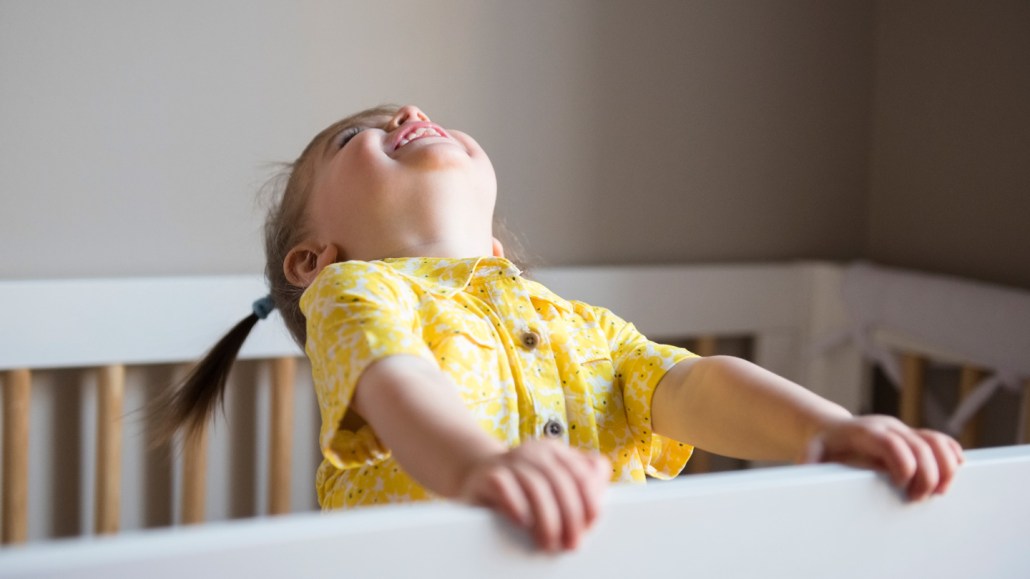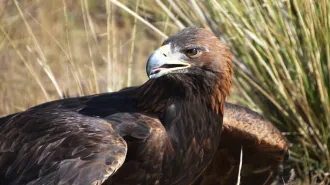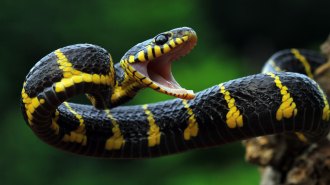
Researchers scoured the internet for clips of laughing 3- to 18-month-olds and had experts and nonexperts listen for clues to laughter’s development in babies’ breaths.
JGI/Getty Images
Babies may laugh like some apes a few months after birth before transitioning to chuckling more like human adults, a new study finds.
Laughter links humans to great apes, our evolutionary kin (SN: 6/4/09). Human adults tend to laugh while exhaling (SN: 6/10/15), but chimpanzees and bonobos mainly laugh in two ways. One is like panting, with sound produced on both in and out breaths, and the other has outbursts occurring on exhales, like human adults.
Less is known about how human babies laugh. So Mariska Kret, a cognitive psychologist at Leiden University in the Netherlands, and colleagues scoured the internet for videos with laughing 3- to 18-month-olds, and asked 15 speech sound specialists and hundreds of novices to judge the babies’ laughs.
After evaluating dozens of short audio clips, experts and about 100 nonexperts both found that younger infants laughed during inhalation and exhalation, while older infants laughed more on the exhale. That finding suggests that infants’ laughter becomes less apelike with age, the researchers report in the September Biology Letters.
Humans start to laugh around 3 months of age, but early on, “it hasn’t reached its full potential,” Kret says. Both babies’ maturing vocal tracts and their social interactions may influence the development of the sounds, the researchers say.
A second trial in the new study with different audio clips and a new group of 100 novices also found that older infants seemed to laugh mainly on exhales. And participants of both trials reported that the more adultlike laughs were more pleasing to hear and contagious. That second finding suggests that the shift in laughter as infants age may partly happen due to unconscious affirmations from the babies’ parents, Kret says. Laughs during exhalation are clearer and louder than during inhalation, she says, sending a stronger signal during interactions that may be better for bonding.
The idea that social interactions shape human babies’ laughs matches observations from chimpanzees, says Marina Davila Ross, a comparative psychologist at the University of Portsmouth in England who was not part of the new study. Davila Ross has found that among chimpanzees in different social groups, laughs can have somewhat different sounds and social functions. And humans and chimps alike adjust their laughs based on peers’ feedback, she says.
Baby giggles
Babies’ laughs develop with time, from the short, panting chortles of a 4-month-old that occur during inhalation and exhalation (first clip) to an 18-month-old’s heart-melting giggles that occur mostly during exhalation (second clip), a new study suggests.
4-month-old laughter
18-month-old laughter
Still, the number of audio clips analyzed in the new study is small, making it difficult to discern trends, says D. Kimbrough Oller, a theoretical biologist at the University of Memphis in Tennessee who wasn’t involved in the research. All together, listeners in the study’s trials heard 108 clips of infants laughing, with each clip lasting four to seven seconds.
And while people may think that babies laugh a lot, Oller says, all-day recordings suggest babies rarely laugh. More often, they’re making other pre-speech sounds: “babbling, squeals, growls, raspberries — babies are producing those all day long.” The intense examples of laughter used in this study that were caught on camera probably aren’t all that representative, he says, so scientists should listen in all day to better understand the range of early laughter.
There’s also much more to laughter than breathing, Davila Ross says. Laughter can take on greater complexity with the vibration of vocal folds and a more melodious sound if vowels are heard. It’s not clear how these aspects of human infants’ and apes’ laughs compare, she says, and a more thorough analysis would examine the structure of laughs’ sound waves.
Reading into laughter’s pleasantness could also be problematic, says Carolyn McGettigan, a psychologist and cognitive neuroscientist at University College London. What people rate as enjoyable may be tangled up with how they perceive kids’ ages. Individuals may, for example, enjoy older infants’ laughs more if they think toddlers are more fun than young infants.
Still, the research provides a good starting place, she says. “Studying these kinds of infant vocal behaviors gives us this window into the evolution of what we can do with our voices.”







